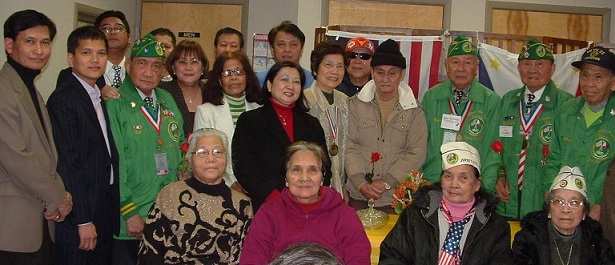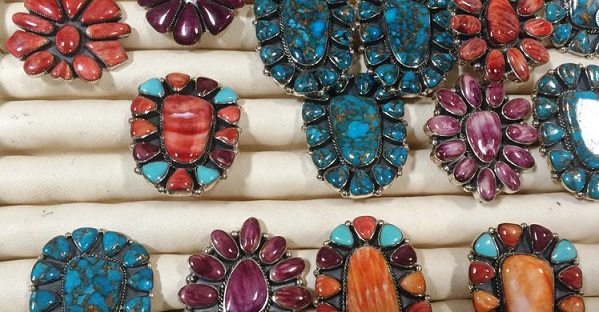Philippine jewelry sold fraudulently as Native American-made; 4 people charged
A federal grand jury in Albuquerque, New Mexico charged four individuals with violating the Indian Arts and Crafts Act (IACA) by conspiring to import and fraudulently sell Filipino-made jewelry as Native American-made.
The investigation targeted an international scheme to violate the IACA, and has included the execution of eight search and seizure warrants and investigative activity in New Mexico, California, Alaska, Kentucky, Nevada and the Philippines.
The three-count indictment charges the following four defendants with conspiring to violate the IACA and the federal fraudulent importation, money laundering, wire fraud and mail fraud laws:
• Imad Aysheh, 41, formerly of Gallup, New Mexico, who is identified as the owner and operator of Imad’s Jewelry, a jewelry manufacturing business in the Philippines;
• Iyad Aysheh, 45, of Lodi, California, who is identified as the chief executive officer and agent for IJ Wholesale, Inc., a California corporation that imports jewelry into the United States;
• Nedal Aysheh, 37, formerly of Gallup, New Mexico, and
• Raed Aysheh, 39, of American Canyon, California, who is identified as the owner and operator of Golden Bear & Legacy, LLC, a retail store in Calistoga, California, that specializes in Native American-style jewelry.
A fifth defendant was indicted in 2015.
According to the indictment, from March 2014 through October 2015, the four defendants conspired to violate the IACA by displaying and offering for sale jewelry manufactured in the Philippines in a manner that suggested that it was Indian-produced and the product of American Indian tribes. The indictment also alleges that these defendants conspired to defraud the United States and its people of money by using the U.S. mail and wire communications to promote the importation and sale of the Filipino-made jewelry as Indian-made, and to launder the proceeds of those unlawful sales.
The indictment alleges that Imad Aysheh manufactured Indian-style jewelry using Filipino labor for import into the United States, and that Nedal Aysheh provided source material and trained the Filipino laborers who manufactured the jewelry. It further alleges that Iyad Aysheh imported the Filipino-made jewelry into the United States; Iyad Aysheh and Raed Aysheh accepted shipments of the Filipino-made jewelry in the United States; and that Iyad Aysheh, Nedal Aysheh and Raed Aysheh distributed the Filipino-made jewelry through jewelry stores purportedly specializing in the sale of Indian-made jewelry.
The indictment identifies 40 specific acts allegedly taken by the defendants in furtherance of the conspiracy, including several sales of the Filipino-made jewelry to individuals who were told that they were purchasing Indian-made jewelry in jewelry stores in Albuquerque and Santa Fe, New Mexico. It also identifies more than 50 financial transactions allegedly conducted by the defendants between April 2014 and October 2015, involving more than $300,000, in amounts ranging from $1,100 to $60,000, in furtherance of the conspiracy.
Iyad Aysheh separately is charged with violating the IACA in Santa Fe County in the summer of 2015, by selling jewelry valued at more than $1,000 that was represented as Indian-made while knowing that the jewelry was not an Indian product.
A fifth defendant, Nael Ali, 53, of Albuquerque, who is identified as the owner and operator of Gallery 8 and Galleria Azul, two arts and crafts retail stores in Albuquerque’s Old Town, also is charged with violating the IACA in Bernalillo County in October 2015. Ali is not charged in the conspiracy count.
The indictment includes forfeiture provisions that seek to forfeit to the United States any proceeds used in or traceable to the defendants’ alleged criminal activities. The indictment also seeks forfeiture of $20,109 in cash, $6,723.04 in a bank account, and more than 1,000 pieces of Indian-style jewelry seized pursuant to search and seizure warrants during the investigation.
The five defendants will be served with summonses requiring them to appear in federal court in Albuquerque to be arraigned on the indictment. If convicted of the charges against them, the defendants each face a statutory maximum penalty of five years in prison and a $250,000.00 fine. Charges in indictments are merely accusations and defendants are presumed innocent unless found guilty in a court of law.
The IACA prohibits the offer or display for sale, or the sale of any good in a manner that falsely suggests that it is Indian produced, an Indian product, or the product of a particular Indian and Indian tribe. The law is designed to prevent products from being marketed as “Indian made,” when the products are not, in fact, made by Indians. It covers all Indian and Indian-style traditional and contemporary arts and crafts produced after 1935, and broadly applies to the marketing of arts and crafts by any person in the United States. IACA provides critical economic benefits for Native American cultural development by recognizing that forgery and fraudulent Indian arts and crafts diminish the livelihood of Native American artists and craftspeople by lowering both market prices and standards. – U.S. Immigration and Customs Enforcement
Editor: Court documents further reveal the Aysheh family operates a factory in Mandaue City, Cebu, citing “cheap labor” in the Philippines.













Good article , thanks.